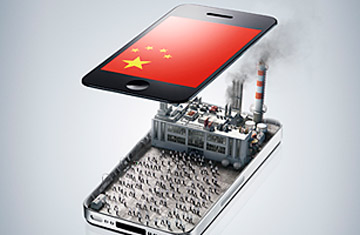
The eggs started smashing against the Apple Store windows just before dawn. Most of the hundreds of people who swarmed the swank plaza adjacent to the glowing, glass-cube outlet had huddled all night long in Beijing's frigid January temperatures. But these weren't early adopters desperate for the newly released iPhone 4S. Nor were they citizens outraged at the labor conditions inside the Chinese factories that churn out Apple gadgets. Instead, most were rural migrants who had been paid about $15 each to purchase iPhones and then hand them over to scalpers who would sell them at inflated prices. (Each buyer was limited to two iPhones per day.) As light began streaking across the morning sky, tempers frayed. Some in the cold, tired crowd were desperate for cash to buy themselves another few days in the big city or, at the very least, a steaming bun for breakfast. A few scuffled with security guards. Eventually, an Apple employee emerged from the store and told the hordes of people that it would remain closed for fear of more violence. Fists flew. So did the eggs--duck and chicken alike. "It makes me really angry that they canceled the sale," said a thick-necked scalper with a shaved head who had loitered in front of the Apple Store for 24 hours and paid a couple hundred migrants to queue for him. "How am I supposed to make money?"
The Chinese scalper may have lost out, but Apple hasn't. In its latest quarterly earnings statement, released in April, the company reported a staggering $39.2 billion in revenue. It was a new record, and the surge was based in large part on a fivefold increase in iPhone sales in China, Taiwan and Hong Kong over the past year. (By contrast, iPhone sales dipped in the U.S. from January to March compared with the previous quarter.) Revenue for Greater China, as this market is called, tripled over the same period to $7.9 billion--about 20% of global sales, compared with just 2% in 2009. A market that three years ago was an afterthought for Apple could soon overtake the U.S. market, the company's longtime consumer base. Credit Suisse estimates that China alone could generate almost $30 billion in sales for Apple by 2015. "Apple fans in China have an almost religious passion," says Sun Chonghui, an analyst with Shanghai-based iResearch Consulting Group. "It's hard to analyze this phenomenon rationally." Sure enough, in April, Chinese state media reported breathlessly about a teenager from eastern China who sold his kidney for about $3,500 to buy an iPad and an iPhone.
Apple symbolizes the best of American Big Business--its innovative drive, its stylish flair, its advertising acumen. The company has also succeeded because of its deep and complex relationship with a country halfway around the world, where nearly all its gadgets are assembled. Labor violations within the tech firm's China supply chain--Apple has no factories of its own and instead contracts assembly out to a vast supplier network--have grabbed headlines in recent months.
